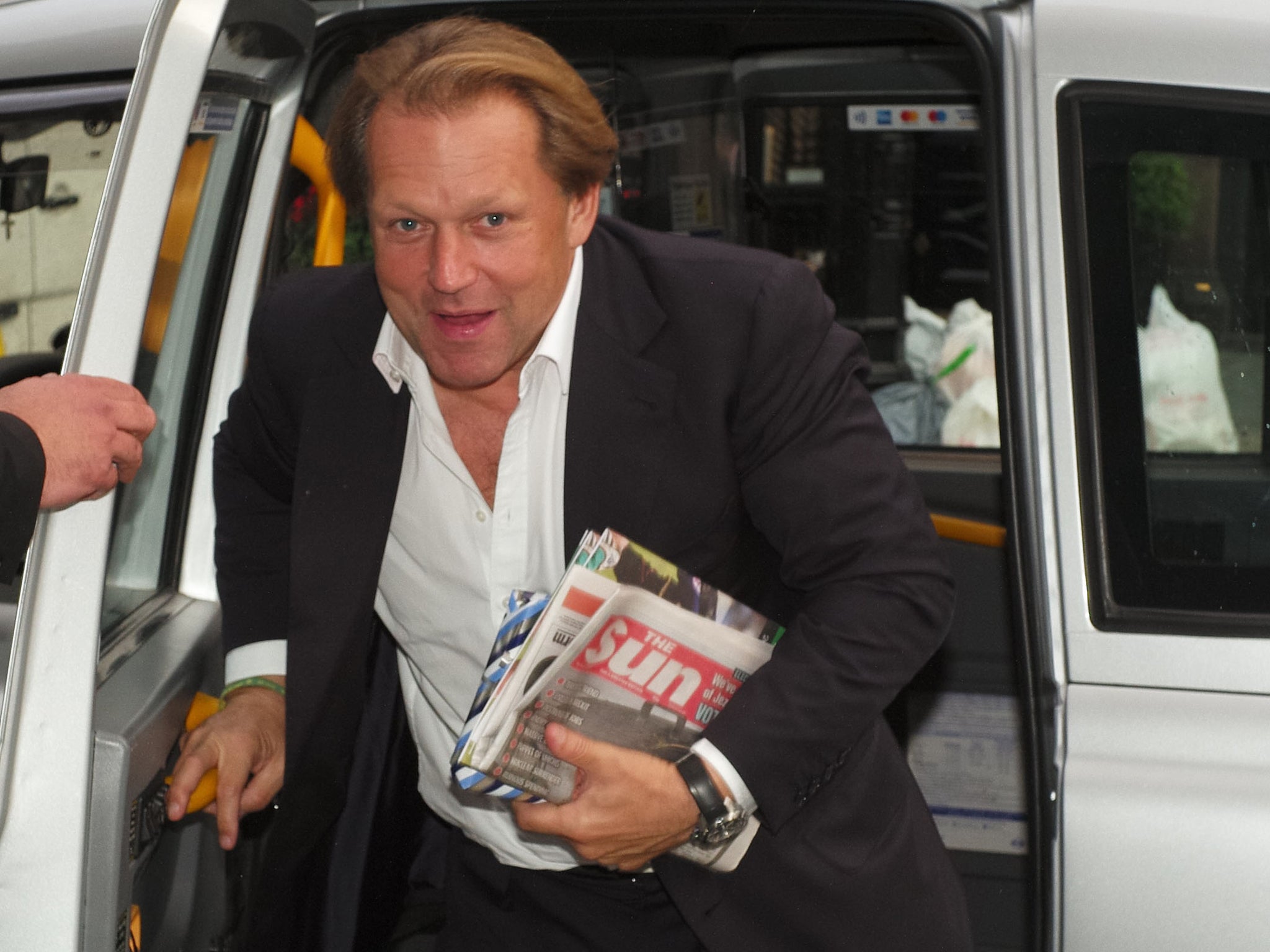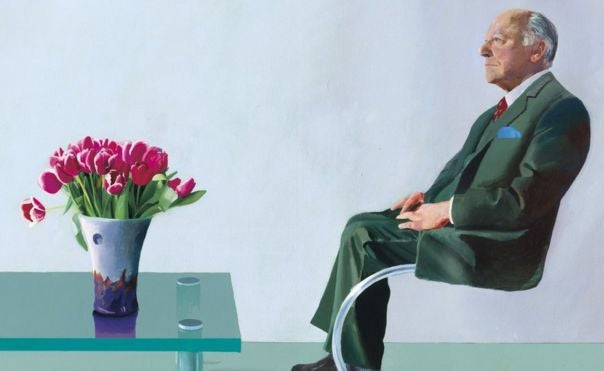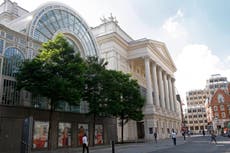The tycoon, the Royal Opera House and the controversial sale of an £11m Hockney
The inside story of how one of the cash-strapped institution’s most prized assets was auctioned off to its own board chair – who then stepped down

When Carphone Warehouse billionaire and major Tory donor David Ross suddenly quit as chair of the Royal Opera House in May, just months into a four-year role, industry insiders were stunned.
Now The Independent can reveal the story behind the scenes, with some Royal Opera House board members said to be “furious” at what they believe to be “disgraceful behaviour by Mr Ross” in which the 56-year-old allegedly secretly sought favourable payment terms at the expense of the public organisation he was meant to be steering towards financial recovery.
It began in July 2020 when the announcement was made that the new chair of the board of trustees would be Mr Ross, who had controversially facilitated accommodation for Boris Johnson during a £15,000 holiday on the island of Mustique over Christmas 2019. That same month the Royal Opera House, facing financial disaster due to the pandemic, decided to sell a major asset to save it from what chief executive Alex Beard called “the biggest crisis in our history”.
The asset to be auctioned was David Hockney’s prized 1971 Portrait of Sir David Webster, the institution’s former chief executive, and Christie’s expected it to fetch up to £18m. A private collector from abroad agreed to guarantee the minimum reserve price of £11m, but at the auction on 22 October, an anonymous “mystery buyer” emerged as the only other bidder and snapped up the Hockney at the “low Christie’s estimate” of £11m, or £13m with fees.
Payment in full was due, but after purchasing the Hockney, the mystery buyer is said to have approached Christie’s with an unusual request – they asked if the agreed terms of settlement could be struck out and softened in favour of the buyer. The Independent understands that it involved an informal request to pay in instalments and over a much longer period, putting the embattled opera house at risk of not getting the money it needed when it needed the funding. Christie's relayed the request to Opera House chief executive Alex Beard who outright rejected the attempt by the mystery buyer to wrangle new terms.
Asked if this decision had gone to the full board which would have resulted in Mr Ross as chair directly (but secretly) negotiating with himself as mystery buyer, Mr Beard said: “Christie’s approached me post-auction regarding settlement and were reminded that payment in full was due by January in accordance with our pre-sale contract. This discussion did not require trustee input. The board [including chair David Ross] was informed that the pre-sale contract would be complied with at its next meeting.”
But at the time the alleged attempt to change settlement terms was made, Mr Beard admitted that he and the Royal Opera House board were completely in the dark as to the identity of the mystery buyer. It would emerge only later that the anonymous buyer who had allegedly sought to secure better financial terms for themselves – to the detriment of the Royal Opera House – was Mr Ross himself.

Mr Beard said that Mr Ross admitted to him that he was the buyer more than three weeks after the auction, “in the week of November 16”, and Mr Beard in turn “informed the board” that same week with a public announcement put out on Friday 20 November. It would appear that the man Mr Beard had been reporting to about the mystery buyer was, himself, the mystery buyer. A spokesperson for Mr Ross denied that he had sought to alter the terms of payment and said it was “standard practice” for bidders in an open auction to not disclose their identities.
One can only imagine how uncomfortable Mr Beard felt to be put in such an invidious position by his own chair who knew more than anyone the full, precarious position of the Royal Opera House and yet had seemingly sought to alter payment terms to his own advantage.
Nevertheless, their official announcement tried to inject a positive spin – reporting that Mr Ross would “loan” the Hockney back to the opera house, thus ensuring the valued portrait remained at the venue and on public display. The sale of the Hockney, set in an acrylic box behind plexiglass, had been “a tough call” because it was originally commissioned and paid for from donations by the opera house’s own staff.
But the fact that Mr Ross had allegedly sought to renegotiate the terms of the payment with the organisation he also chaired without revealing his identity as the mystery buyer was never made public.
Mr Beard has remained tight-lipped about what words passed between him, the board and Mr Ross, but The Independent has learnt that several members of the 18-strong board were said to be “furious” at what they called Mr Ross’s “appalling behaviour”.
Those sympathetic to Mr Ross say the payment terms imbroglio is a storm in a teacup and what he did was ultimately a good thing
One board member, who spoke on condition of anonymity, said: “I don’t know why Mr Ross behaved as he did but it has severely pissed off members of the board. Should he have been more straightforward in his communication from the start? Of course. Should he have approached Christie’s to seek a change of payment terms? Of course not. Did it fray people’s patience with him? Yes, of course it did.”
The Royal Opera House board boasts an array of prominent figures, including former Treasury mandarin Sir John Kingman, former BP chief executive Lord Browne, founder of Travelex Sir Lloyd Dorfman, philanthropist Vivien Duffield and Lady Heywood, widow of former cabinet secretary Sir Jeremy Heywood. Investment banker Sir Simon Robey, a previous chair, has stepped in as interim chair.
Mr Ross, whose net worth plummeted from £1bn in 2015 to £642m in 2020, according to The Sunday Times Rich List, had seen off competition for the role from George Osborne, former chancellor and ex-editor of the Evening Standard. He is said to have donated over £700,000 to the Conservative Party and last month he was criticised by the Commons Standards Committee for failing to make a timely and full disclosure of the prime minister’s Mustique holiday arrangements.

He started at the Royal Opera House last September and had been supposed to stay in post until late 2024 but in May it was announced he was leaving. The reason given was that he was about to be re-appointed by the government for a second term as chair of the National Portrait Gallery (NPG), a post he had pledged to vacate when he joined the opera house.
So did he exit because of upset over the Hockney or because of the NPG? Sources close to the situation said it was “both”. “He had initially assured the opera house he would give up the NPG but when the culture secretary wanted to re-appoint him, it became a fig leaf and convenient excuse,” said the source.
A Royal Opera House board member added: “Some board members were upset about his Christie’s call to soften payment terms, others about his decision not to give up the NPG. We were clear when we appointed him that he could not chair both and he assured us he would step back from the NPG. When he didn’t, we acted.”
Those sympathetic to Mr Ross say the payment terms imbroglio is a storm in a teacup and what he did was ultimately a good thing: his purchase of the Hockney and loan back to the opera house preserves British ownership and keeps it on public display in the UK.
A spokesperson for Mr Ross said he had been “concerned that this important piece of institutional art could potentially be bought by an overseas collector and taken out of public view”, adding: “Instead, Mr Ross has ensured that it will remain available to the British public and will go back on display at the Royal Opera House as it opens for the new season. It will then be lent to the National Portrait Gallery in 2023.
“Mr Ross informed the trustees within a matter of weeks that he had purchased the painting to help shore up their finances and that he would immediately return the piece to the Royal Opera House so that the public could continue to enjoy this masterpiece.”
A request to see board minutes covering the discussion of the Hockney sale and what was said by and to Mr Ross was declined. A spokesperson for the Royal Opera House said: “The terms of payment were as contracted with Christie’s in October and at no point did the board consider a variation on these terms.”
Join our commenting forum
Join thought-provoking conversations, follow other Independent readers and see their replies
Comments
Bookmark popover
Removed from bookmarks